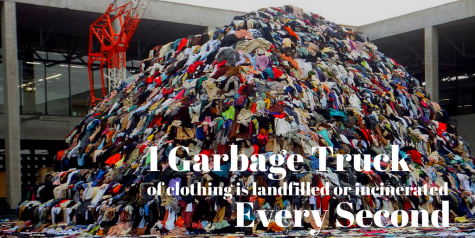So you want to talk about fast fashion?
January 21, 2021
Special occasions and the arrival of a new season is always an excuse to purchase new pieces for your already tight-fit wardrobe. Many pay a visit to reputable and generic stores that fan-favorite influencers get sponsored by. The instant gratification of a new outfit is what many of us are addicted to, although I’m sure your last season skirt would still do the trick.
Fast fashion companies appeal to us, they produce on-trend clothing at a price we deem acceptable. Getting bombarded with emails about their “next big sale, that you can’t miss.” But everything has consequences, so what’s so harmful about cheaply priced crop tops and jeans?
You might be wondering, “what even is fast fashion?” Defined as “inexpensive clothing produced rapidly by mass-market retailers in response to the latest trends,” fast fashion reels in a substantial amount of money. In the U.S. alone, the fashion industry is valued at approximately 368 billion dollars as of 2019.
On average, fast fashion pieces never get worn more than five times because trends die out so quickly. People buy a large number of inexpensive pieces that are easily damaged and never worn again, instead of purchasing quality pieces from small ethical businesses or buying second-hand. This not only hurts your pockets but causes detrimental effects to our environment.
The consequences of mass consumerism result in a huge increase in the volume of textile waste. Fast fashion uses the cheapest workers, factories and materials they can get. If you took a moment to check your tags, you’d notice the common fiber: polyester. This fiber takes hundreds of years to degrade, yet more than 50% of clothes are made from this material. The footprint is almost three times more carbon dioxide than cotton.
Unfortunately, it doesn’t stop at just polyester, on average 70 million trees are logged every year to create another fiber called rayon. In the U.S. alone, clothing landfills occupy more than 125 million cubic yards each year, and most of these clothes are non-biodegradable.

Toxic runoff from these factories seeps into local rivers and lakes, contributing to the contaminated water in many third world countries. The fashion industry comes in as the second-highest polluter of clean water. One cotton t-shirt uses enough drinking water to sustain one human for three years, which is 2,700 liters. While fast fashion contributes to landfill waste, water pollution, and our carbon footprint, it doesn’t stop there. Fast fashion has become a human rights issue due to unfair labor practices.
Very few know about the Rana Plaza incident in 2013. Western companies and low wages helped turn Bangladesh into one of the most profitable countries for fast fashion factories. Courts in Bangladesh charged 38 people with murder in connection with the collapse of the Rana Plaza, which contributed to the deaths of 1,135 people and the country’s worst industrial disaster. Demands for better safety in the world’s second-largest exporter of fashion put pressure on companies working with Bangladesh to act.
Fast fashion impacts consumers themselves, encouraging the “throw-away” culture. More consumers have been calling out the ugly truths concerning the fashion industry, and the number of retailers introducing pseudo-sustainable fashion initiatives, such as in-store recycling schemes. It’s been highlighted that only 0.1% of all clothing collected by charities and take-back programs is recycled into a new textile fiber.
Generation Z is helping to combat these issues. 74% of young adults prefer to purchase from “sustainably conscious brands” and are 2.5 times more likely to purchase second-hand clothing, as compared to other generations. The hope would be that the profound environmental crisis would inspire companies to be intersectional in their solutions. Helping to combat the issues that affect us all. This would look like including plus size and any other marginalized communities in the discussion.
I leave you will the followed advice quoted by British designer Vivienne Westwood “buy less, choose well, make it last.”